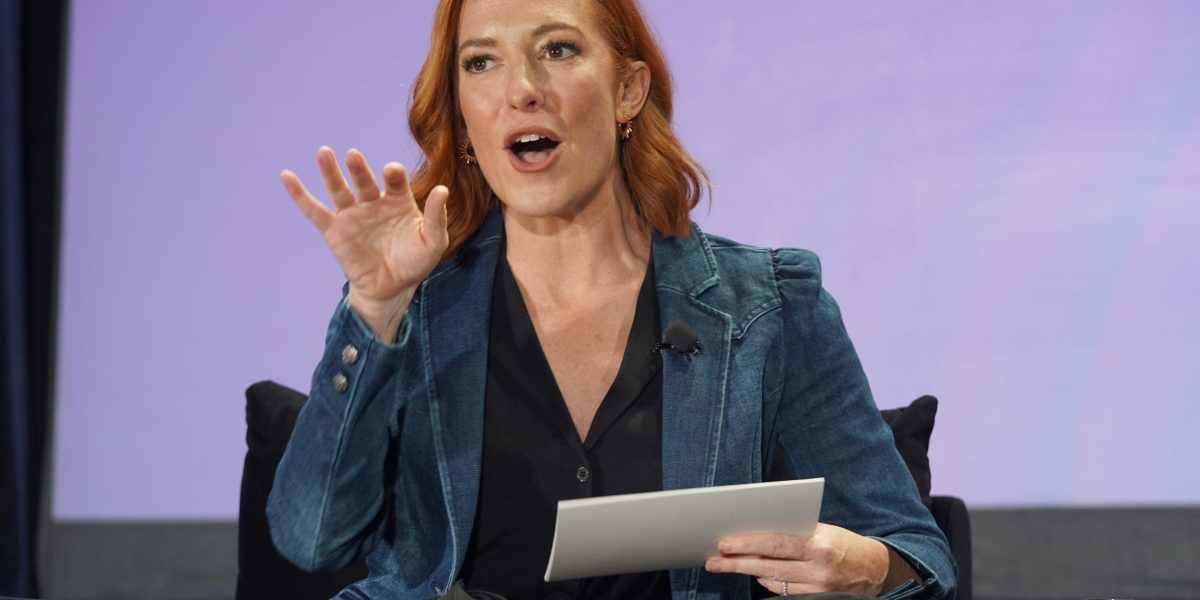Jen Psaki, a former communications lead for President Barack Obama and first White House press secretary for President Joe Biden, thinks the Democrats have a strong chance of taking it all in November.
Vice President Kamala Harris’s campaign is focused pretty squarely on the right strategy at the moment, Psaki, currently the host of MSNBC’s Inside With Jen Psaki, told Fortune in an interview Wednesday. Namely, appealing to elusive undecided voters.
The Harris team is “working to convert and convince and persuade voters who may not have made a final decision,” explained Psaki. One such effort in that direction was the Democratic nominee’s recent series of campaign events with Liz Cheney, aimed at galvanizing never-Trump Republicans, mainly women.
One potentially surprising roadblock: Harris isn’t Biden, and Biden remains “very popular among many, many Democrats.”
The President’s decision this summer to end his campaign only made him more popular, Psaki said. “He is very popular among older white voters, which is a group of voters that [Harris] needs to continue to expand her base of support with.”
Any candidate, in the weeks leading up to Election Day, shouldn’t be focusing just on galvanizing their own base and mobilizing people to show up at the ballot box—though that’s certainly “always a big message,” she added.
The crux of Harris’s issue, in these crucial final days, is to make clear to the Biden lovers out there—and there are many in the Democratic party, Psaki said—that she values and respects her predecessor, and she’s honored to be his potential successor.
But she has to toe the line and also express that she’ll “pave a different road in some areas,” Psaki said. “I think that is a tricky road, but it is certainly possible to implement.”
Courting the never-Trump Republicans
Harris “is basically saying to people, ‘You’re invited into this party. We want you to be a part of this.’” Psaki said. “That, to me, is a recognition that in order to win, you have to expand the base of the electorate.”
There’s another factor the Harris campaign would do well to keep top of mind, Psaki added. Aside from being infamously bombastic and off-the-cuff, Trump is still an “incumbent of sorts.” That advantage makes him even less fit to be underestimated.
“He’s a former president; he has a high floor of support, meaning there are people who support him, even if, as he were to say, he were to shoot somebody on Fifth Avenue,” Psaki said. “That bends the mind—I think we can all acknowledge that—but he does have that base of support.”
That base is largely made up of people who feel “forgotten, disappointed, and disgruntled with the government,” she has observed. “And Trump has tapped into and spoken to that pretty consistently since he came up that elevator.”
Psaki contends Trump isn’t actually fighting for those people: people “living paycheck to paycheck” and those who “feel disappointed by the system.” Trump has also benefited from a “huge amount of disinformation.”
Nonetheless, “sometimes people forget that he is a former president,” she said. “He was the leader of the Republican Party. Has been for nearly a decade, and there is a base of support that comes with that.”
Making her own name
One thing everyone can agree on, across party lines: There’s no precedent for the current moment. That’s one of Harris’s main challenges in her run against Trump, Psaki said, “even though Harris has far better policies.”
Then there’s the thorny issue of carrying on the best of Biden’s legacy, while also carving out Harris’s own identity with a newer, younger approach. “She needs to be mindful that [she] also was his vice president—still is his vice president,” Psaki said. “She can’t not run on the things that they have done together, because that is part of her qualification. But it’s not a carbon copy, because events in the world and issues people are grappling with, and circumstances, and even your own positions evolve.”
Take gay marriage as an example. “Barack Obama was not openly for gay marriage; neither was Joe Biden in the first [Obama] term,” Psaki said. “That changed.”
A new identity
Then of course there’s Harris’s identity as a Black woman nearly 20 years younger than the president. “She inherently comes to every discussion and debate from a different viewpoint,” Psaki said. “And that does matter, as somebody who sat at a table where I look different sometimes, just as being a woman, from other people at the table. That perspective does matter, and I think it’s important for people to remember.”
But the issues of policy may prove to be a consistent thorn in Harris’s side. “As the sitting vice president, just on a technical level, I think there’s a lot of desire to hear and understand from people who are very disappointed,” Psaki said. In particular: Harris’s plans with regard to the Israeli-Palestinian disaster.
“Negotiations are happening about how to bring about a ceasefire, bring an end to the conflict and the war and the suffering in Israel and Gaza,” Psaki said. But Harris can’t come out with a different position than Biden has. “She’s currently the sitting vice president. She’s not just somebody who primaries the president. So that’s a challenge.”
